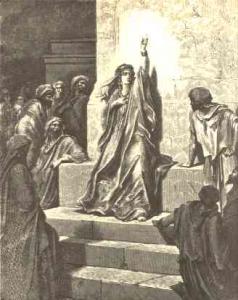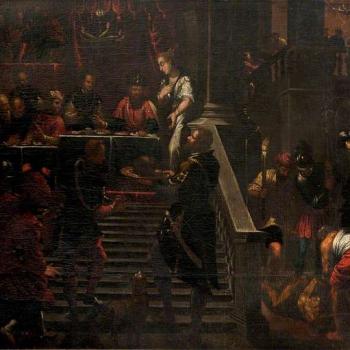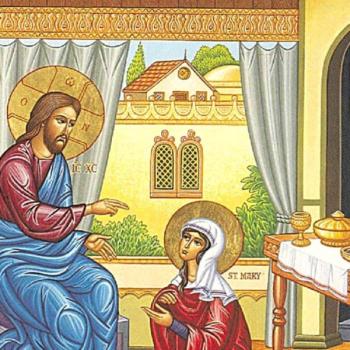There’s a temptation to assume that Christian women should both be – and want to be – mothers. Our churches tend to celebrate women and motherhood at the same time. For example, sermons around women are usually reserved for Mother’s Day, Christmastime (involving Mary), and special days devoted to motherhood among a congregation. We don’t hear sermons of the powerful Deborah or Jael, we skip over the Prophetess Huldah, and stick to images of women that are culturally comfortable. Bible women without children aren’t a thought on our calendars.
In honor of International Women’s Day and Women’s History Month, it’s time to look at a few Bible women without children. These aren’t women who, like Hannah, sought to have a child. These are women we have no record of ever having a baby. We also don’t see any text displaying sorrow or regret over such. They remind us that different women have different circumstances. Not every believing woman is cut out for parenthood. The same God Who created motherhood also created medicine, finance, business, ministry, education, and beyond. Wherever He calls us – regardless of familial status – there we can best serve.
Here are some of the most amazing childless Bible women.
Miriam: First Lady of the Exodus
Miriam was the sister of Moses and Aaron. She’s the Bible’s first identified prophetess, one of the seven major prophetesses of Israel. Along with her brothers, she was part of the exodus out of Egypt. Her major role appears to be musical, as she led the Israelites in song after their victory.
The Bible doesn’t indicate Mariam ever married. Some Jewish traditions assign her a husband, but their accuracy is unknown. Either way, it’s definitive Miriam didn’t have children. Instead, she was a central figure, busy in her work to lead the Israelites across the Red Sea and through the wilderness.
Then Miriam the prophet, Aaron’s sister, took a timbrel in her hand, and all the women followed her, with timbrels and dancing. Miriam sang to them:
“Sing to the Lord,
for he is highly exalted.
Both horse and driver
he has hurled into the sea.” (Exodus 15:20-21, NIV)

Deborah: Mother of Israel
In a previous column, I spoke of Deborah as an overlooked Old Testament leader. Whether we consider it or not, Deborah played a heavy role in Bible history. After Joshua’s death, Israel had no successor. Over a period of several hundred years, Israel would rise and fall at the hands of its surrounding neighbors. After 40-year periods of time, God would raise up an individual known as a judge to redeem Israel from its bondage. Deborah was the only female judge and only judge who was also a prophet. Cited as a mother of Israel, Deborah established structure and order in a time of anarchy in Biblical history. Under her rule, Israel conquered the Canaanites. Their leader, Sisera, was conquered by Jael, a woman. Deborah, along with Jael, are praised for skill in battle in Judges 4 and 5.
“In the days of Shamgar son of Anath,
in the days of Jael, the highways were abandoned;
travelers took to winding paths.
Villagers in Israel would not fight;
they held back until I, Deborah, arose,
until I arose, a mother in Israel.” (Judges 5:6-7, NIV)
Huldah: Prophet of the College
Huldah is an overlooked Biblical woman and prophet. She was the wife of Shallum, wardrobe keeper during King Josiah’s reign. From what we know, she was over a school of the prophets or instructor in one. When questions arose about a book of the law discovered during construction, Hilkah the priest, Ahikam, Achbor, Shaphan the scribe, and Asiah were sent by King Josiah to find someone to interpret it. They were concerned, as their ancestors didn’t obey its contents. As a result, they feared the wrath of God might come upon them.
The men went to Huldah, who said God would bring calamity upon the nation. The work was authentic. Destruction would come on those who refused to obey. She did revere Josiah’s faithfulness, and promised he would not see the foretold destruction. Huldah was the first person in history to declare a passage of Scripture as both authentic and inspired.
She said to them, “This is what the Lord, the God of Israel, says: Tell the man who sent you to me, ‘This is what the Lord says: I am going to bring disaster on this place and its people—all the curses written in the book that has been read in the presence of the king of Judah. Because they have forsaken Me and burned incense to other gods and aroused My anger by all that their hands have made, My anger will be poured out on this place and will not be quenched.’ (2 Chronicles 34:23-25, NIV)
Esther: Queen of Persia
Esther is a Biblical story that doesn’t get much attention. It’s a historical narrative, depicting how Esther (born Hadassah), a Jewish exile in Persia, became the wife of King Xerxes by divine arrangement. Esther, an orphan, was raised by Mordecai, a close relative. When king Xerxes was ready to replace the deposed Queen Vashti, Esther was chosen to be part of the harem. She was selected as queen. In the meantime, Mordecai discovers a sinister plot on the part of Haman to destroy the Jewish people. Taking the matter to Esther, she resolved to step up, think quickly and cleverly, and save her people from genocide. Jews worldwide celebrate the Feast of Purim in her honor every spring.
Then Esther sent this reply to Mordecai: “Go, gather together all the Jews who are in Susa, and fast for me. Do not eat or drink for three days, night or day. I and my attendants will fast as you do. When this is done, I will go to the king, even though it is against the law. And if I perish, I perish.” (Esther 4:16, NIV)
Anna: Temple Prophetess
The Bible is full of postmenopausal women who miraculously conceived in their old age. Anna was not one of them. She was a prophetess, the daughter of Phanuel, of the tribe of Asher. We don’t know anything about her early life, but it’s safe to say she was an old woman when she enters our Bible story. Some records say she was 84, others say she might have been as old as 105! She was devoted to worship, staying in the temple grounds day and night, fasting and praying.
When the Christ child was presented in the temple, she knew who He was immediately. She then spoke to all who were waiting for the Messiah to come. This means the first person to tell others about Christ and spread the good news that He was in the world was not a man, but the Prophetess Anna!
There was also a prophet, Anna, the daughter of Penuel, of the tribe of Asher. She was very old; she had lived with her husband seven years after her marriage, and then was a widow until she was eighty-four. She never left the temple but worshiped night and day, fasting and praying. Coming up to them at that very moment, she gave thanks to God and spoke about the child to all who were looking forward to the redemption of Jerusalem. (Luke 2:36-38, NIV)
Mary and Martha: Sisters Serving Jesus
Mary and Martha are portrayed as contradictions. Martha is busy with distractions, while Mary is devout and pious. If we’re honest, there’s a little bit of both in all of us…and the spiritual side doesn’t always win. Regardless, these two women were devout followers of Christ, even if they missed the mark at times. The text tells us Martha, not Mary, took Jesus to her home, where Mary then enters the picture. It also appears they were unmarried Bible women without children, busy serving the Lord.
As Jesus and his disciples were on their way, He came to a village where a woman named Martha opened her home to Him. She had a sister called Mary, who sat at the Lord’s feet listening to what He said. But Martha was distracted by all the preparations that had to be made. She came to Him and asked, “Lord, don’t you care that my sister has left me to do the work by myself? Tell her to help me!”
“Martha, Martha,” the Lord answered, “you are worried and upset about many things, but few things are needed—or indeed only one. Mary has chosen what is better, and it will not be taken away from her.” (Luke 10:38-42, NIV)
Mary Magdalene: First Apostle of the Resurrection
Whether you think of Mary Magdalene as maiden, harlot, or mystery, you’ve likely heard something about her. There are a few different legends surrounding this woman, most of which are false. We don’t know much of her life, save her work in early Christian history. Her name indicates where she’s from rather than her family line, indicating she was likely of renown and unmarried. Scripture tells us Jesus cast seven demons out of her. She was a close associate of Jesus, following Him throughout His ministry, and beyond. She stands as the first to see Christ resurrected, and was sent to tell the good news to the male apostles. This marks her as the first apostle of the resurrection. According to church history, she served as apostle over a large portion of the early church.
Mary Magdalene went to the disciples with the news: “I have seen the Lord!” And she told them that He had said these things to her. (John 20:18, NIV)
Bible women without children form an amazing legacy
It’s obvious Bible women without children are amazing! There’s no question that being a parent can be an awesome thing. However, we benefit to remember that life itself is amazing, no matter what path we take. Just as there are great things associated with parenthood, there’s great things associated with being childless, too. These Bible women without children prove to us there’s no wrong way to be a woman. No matter what your course of life, there’s great things to know, see, and discover, because each journey is unique.














